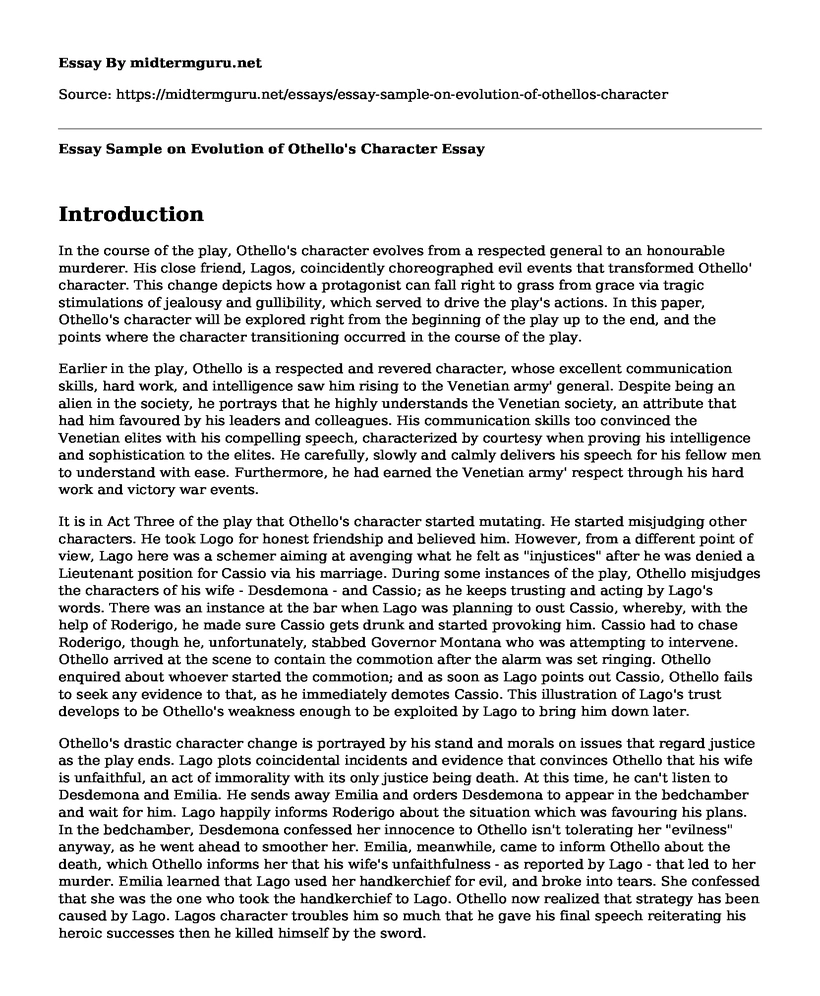Introduction
In the course of the play, Othello's character evolves from a respected general to an honourable murderer. His close friend, Lagos, coincidently choreographed evil events that transformed Othello' character. This change depicts how a protagonist can fall right to grass from grace via tragic stimulations of jealousy and gullibility, which served to drive the play's actions. In this paper, Othello's character will be explored right from the beginning of the play up to the end, and the points where the character transitioning occurred in the course of the play.
Earlier in the play, Othello is a respected and revered character, whose excellent communication skills, hard work, and intelligence saw him rising to the Venetian army' general. Despite being an alien in the society, he portrays that he highly understands the Venetian society, an attribute that had him favoured by his leaders and colleagues. His communication skills too convinced the Venetian elites with his compelling speech, characterized by courtesy when proving his intelligence and sophistication to the elites. He carefully, slowly and calmly delivers his speech for his fellow men to understand with ease. Furthermore, he had earned the Venetian army' respect through his hard work and victory war events.
It is in Act Three of the play that Othello's character started mutating. He started misjudging other characters. He took Logo for honest friendship and believed him. However, from a different point of view, Lago here was a schemer aiming at avenging what he felt as "injustices" after he was denied a Lieutenant position for Cassio via his marriage. During some instances of the play, Othello misjudges the characters of his wife - Desdemona - and Cassio; as he keeps trusting and acting by Lago's words. There was an instance at the bar when Lago was planning to oust Cassio, whereby, with the help of Roderigo, he made sure Cassio gets drunk and started provoking him. Cassio had to chase Roderigo, though he, unfortunately, stabbed Governor Montana who was attempting to intervene. Othello arrived at the scene to contain the commotion after the alarm was set ringing. Othello enquired about whoever started the commotion; and as soon as Lago points out Cassio, Othello fails to seek any evidence to that, as he immediately demotes Cassio. This illustration of Lago's trust develops to be Othello's weakness enough to be exploited by Lago to bring him down later.
Othello's drastic character change is portrayed by his stand and morals on issues that regard justice as the play ends. Lago plots coincidental incidents and evidence that convinces Othello that his wife is unfaithful, an act of immorality with its only justice being death. At this time, he can't listen to Desdemona and Emilia. He sends away Emilia and orders Desdemona to appear in the bedchamber and wait for him. Lago happily informs Roderigo about the situation which was favouring his plans. In the bedchamber, Desdemona confessed her innocence to Othello isn't tolerating her "evilness" anyway, as he went ahead to smoother her. Emilia, meanwhile, came to inform Othello about the death, which Othello informs her that his wife's unfaithfulness - as reported by Lago - that led to her murder. Emilia learned that Lago used her handkerchief for evil, and broke into tears. She confessed that she was the one who took the handkerchief to Lago. Othello now realized that strategy has been caused by Lago. Lagos character troubles him so much that he gave his final speech reiterating his heroic successes then he killed himself by the sword.
Conclusion
To conclude with, Othello's character transforms from a heroic and respected one to a murderous one coupled with jealousy. This leads to his tragic fall. On realizing the true definition Lago's character, Othello couldn't live and hold up to his intelligent and polite traits which he had shown earlier own. The character evolution pertaining Othello served to drive the play's actions.
Works Cited
Shakespeare, William et al. The Tragedy Of Othello, The Moor Of Venice.
Cite this page
Essay Sample on Evolution of Othello's Character. (2023, Feb 09). Retrieved from https://midtermguru.com/essays/essay-sample-on-evolution-of-othellos-character
If you are the original author of this essay and no longer wish to have it published on the midtermguru.com website, please click below to request its removal:
- Literature Essay Sample: Effect of Imagination on Physical Spaces in Peter Pan
- Essay on An American Tragedy by Theodore Dreiser
- Close Reading of Macbeth by Shakespeare - Essay Sample
- Essay on Downfall of Major Characters in Flannery O'Connors Short Stories
- Comparison Between "The Passionate Shepherd to His Love" and "The Nymph's Reply to the Shepherd"
- Literary Analysis Essay on Incidents in The Life of a Slave Girl by Harriet Jacobs
- On Turning Ten by Billy Collins - Poetry Analysis Essay







